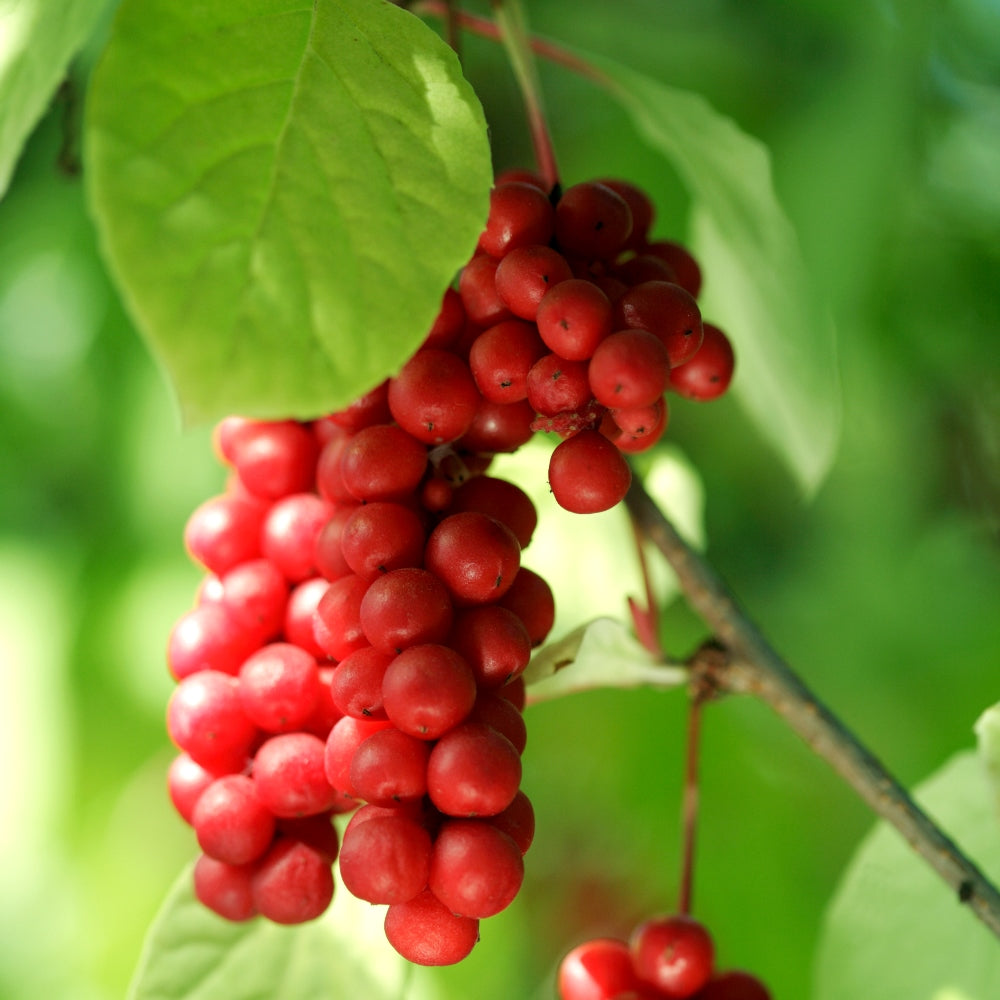
Schisandra berry
Share
One of my absolute favorite herbs, this flavorful berry has been a lifesaver for me personally, as it excellent for the adrenal glands and the stress response, helping to increase resiliency and stabilizing energy levels. As an herbal "adaptogen," schisandra berry is in a category dominated mostly by the roots of plants, such as ginseng, rhodiola, and ashwagandha. It is a berry that possesses all five flavors - sour, sweet, salty, pungent, and bitter. I like to describe biting into one of the dried berries as a "party in your mouth." I often encourage people to try it in my classes, as it's interesting to see who wants to spit it out immediately, who finds it complex and interesting but scrunch up their faces anyway, and who actually really likes the taste! In Chinese medicine, there is a lot of significance to the flavor/taste profile of an herb. Because schisandra berry has all the tastes, it is considered beneficial to the five yin organs: the liver, kidneys, heart, lungs, and spleen, as well as activating all the meridians.
Schisandra is used as a balancing adaptogen, helping the body adapt better to stress via its effect on the HPA axis (Hypothalamus-Pituitary-Adrenal axis). Taken morning and evening, this herb can help balance the daytime flow of energy in the body, helping to increase energy through the day and helping to calm down the body for restful sleep at night. If this rhythm is out of whack, then this herb can be your ally when taken morning and evening consistently for 2-3 months. If you're a fan of the dried berries, a small palmful (about 1 tsp) of the berries can be chewed. But, for those of us who are not so tough, I recommend the tincture (alcohol extract) or the glycerite (vegetable glycerin extract) which is my personal favorite. I can take this directly in my mouth or in some water and enjoy the sweet-sour flavor. We have also made tea formulations with the dried berry, but it is really best when crushed and simmered to extract the most medicine, so can be blended with herbs like ginger, licorice, and/or cinnamon to improve the sour-bitter flavor.
Schisandra berries are also hepatoprotective, showing protective effects on liver cells and even regenerative benefits as an effective antioxidant. This is partially due to constituents of schisandra extracts stimulating liver cells to make the enzyme glutathione peroxidase, helping deactivate several kinds of free radicals. This and other actions make this herbal medicine beneficial for protecting the liver in cases of chemical exposure, drug/pharmaceutical use, and certain infections that can harm the liver, as well as helping to restore healthy liver function after damage. Since we live in a world where we have much for our liver's to process and contend with, this herb can be so beneficial.
Schisandra has antioxidant, anti-inflammatory, and anti-asthmatic effects also, helping with lung health and asthma that includes wheezing and a wet cough. It is also a useful remedy for balancing the nervous system, helping with stress-induced heart palpitations, anxiety, and insomnia, while also helping with alertness and mental focus/performance. It is also one of the herbs used to address attention deficit disorders, especially when combined with other nervine stimulants, like bacopa and rhodiola.
As an endocrine-balancing herb, with some drying effects, it is useful for decreasing hot flashes, night sweats, and heart palpitations in menopausal women. It is also thought to regulate ovarian and testicular function based on animal studies, so may be helpful for fertility for both males and females. Schisandra is also used to nourish and balance the thyroid gland, so can be useful for someone with a low-functioning thyroid and/or experiencing symptoms such as low energy and hair loss.
Schisandra berry is also an immune amphoteric, meaning it can help regulate the immune response, whether immune depletion (low-functioning immune system, cancer) or hyperactive immune response (such as allergies or allergic asthma).
In summary, this herb has a broad spectrum of actions that are incredibly beneficial for the human body, and is a classic example of an adaptogenic herb. In general, you want to use this herb over a period of time to achieve beneficial results, especially for chronic conditions and stress states. Cycling off of it every 3-6 months for a couple of months is a good idea also simply because the body may stop responding as well over time, but it can be used safely long-term.
